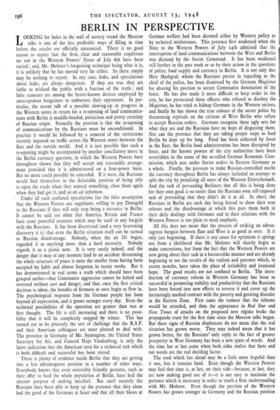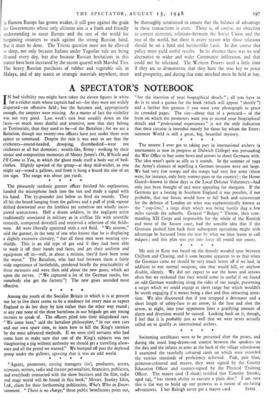BERLIN IN PERSPECTIVE
LOOKING for holes in the wall of secrecy round the Moscow talks is one of the less profitable ways of filling in time before the results are officially announced. There is no good reason to expect that the firm, clear and reasonable conditions set out in the Western Powers' Notes of July 6th have been varied ; and, Mr. Molotov's bargaining technique being what it is, it is unlikely that he has moved very far either. So there simply may be nothing to report. In any case, leaks, and speculations about leaks, are always dangerous. If they are true they are liable to mislead the public with a fraction of the truth ; and false rumours are among the better-known devices employed by unscrupulous bargainers to embarrass their opponents. In par- ticular, the recent talk of a possible slowing-up in progress in the Western zones in return for a re-opening of land communica- tions with Berlin is muddle-headed, pernicious and pretty certainly of Russian origin. Formally the position is that the re-opening of communications by the Russians must be unconditional. In practice it would be followed by a removal of the restrictions recently imposed on traffic across the Western zones between the East and the outside world. And it is just possible that such a re-opening might be accompanied by another conciliatory move in the Berlin currency question, in which the Western Powers have throughout shown that they will accept any reasonable arrange- ment provided that it is administered on a four-power basis. But no more could possibly be conceded. If it were, the Russians would find themselves in the delectable position of being able to open the roads when they wanted something, close them again when they had got it, and so on ad infinitum.
• Under all such confused speculations lies the false assumption that the Western Powers are suppliants, willing to pay Danegeld to the Russians if they will only stop being a nuisance in Berlin. It cannot be said too often that America, Britain and France hafe some powerful counters which may be used in any bargain with the Russians. It has been discovered (and a very heartening discovery it is) that even the Berlin situation itself can be turned to Russian disadvantage. Nobody, when the air lift began, regarded it as anything more than a hard necessity. Nobody regards it as a picnic now. It is very costly indeed, and the danger that it may at any moment lead to an accident threatening the whole structure of peace is none the smaller from having been accepted by habit and almost forgotten.in recent weeks. But it has demonstrated in real terms a truth which should have been grasped earlier—that Communist aggression cannot be halted and reversed without cost and danger, and that, once the first critical decision is taken, the benefits of firmness at once begin to flow in. The psychological response from the German people has been beyond all expectation, and it grows stronger every day. Even the technical possibilities of the operation are greater than was at first thought. The lift is still increasing and there is no possi- bility that it will be completely stopped by winter. This has turned out to be precisely the sort of challenge that the R.A.F. and their American colleagues are most pleased to deal with. The presence in Germany of Mr. Symington, the United States Secretary for Air, and General Hoyt Vandenberg, is only the latest indication that the American taste for a technical task which is both difficult and successful has been stirred.
There is plenty of evidence inside Berlin that they are getting into a less advantageous position in a number of other ways. Everybody knows that even ostensibly friendly gestures, such as their offer to feed the whole population of Berlin, have had the ulterior purpose of making mischief. But until recently the Russians have been able to keep up the pretence that they alone had the good of the Germans at heart and that all their blows at German welfare had been dictated either by Western policy or by technical misfortunes. This pretence first weakened when the Note to the Western Powers of July 14th admitted that the interruption of land communications between the West and Berlin was dictated by the Soviet Command. It has been weakened still further in the past week or so by their action in the questions of police, food supply and currency in Berlin. It is not only that Herr Markgraf, whom the Russians persist in regarding as the chief of the police, has been dismissed by the German Magistrat for abusing his position to secure Communist domination of the force. He has also made it more difficult to keep order in the city, he has persecuted those officers who refused to disobey the Magistrat, he has tried to kidnap Germans in the Western sectors, and finally he has shown the true colours of the secret police by threatening reprisals on the citizens of West Berlin who refuse to accept Russian orders. Germans recognise these ugly acts for what they are and the Russians have no hope of disguising them. Nor can the pretence that they are taking proper steps to feed Berlin be kept up for long. Food has been collected by force in the East, the Berlin food administration has been disrupted by force, and the known powers of the city authorities have been overridden in the name of the so-called German Economic Com- mission, which acts under Soviet orders in Eastern Germany as a whole. Finally, the pressure to make Russian-controlled marks the currency throughout Berlin has always included an attempt to split the city by penalising all users of the Western Deutschemark. And the task of persuading Berliners that all this is being done for their own good is no easier than the Russians own self-imposed task of pretending that they didn't do it at all. In short, the Russians in Berlin are each day being forced to show their true colours and the disadvantage at which this puts them both in their daily dealings with Germans and in their relations with the Western Powers is too plain to need emphasis.
All this does not mean that the process of striking an advan- tageous bargain between East and West is as good as over. It is only just beginning. If there is any cause for optimism it springs not from a likelihood that Mr. Molotov will shortly begin to make concessions, but from the fact that the Western Powers are now going about their task in a businesslike manner and are already beginning to see the results of the realism and patience which, in recent months, have taken the place of irritability and irrational hope. The good results are not confined to Berlin. The intro- duction of currency reform in Western Germany has been so successful in promoting stability and productivity that the Russians have been forced into new efforts to reverse it and cover up the increasingly marked contrast with the poverty and growing disorder in the Eastern Zone. First came the rumour that the reforms would be retarded, and then the appearance in Red Star and New Times of attacks on the proposed new regime broke the propaganda truce for the first time since the Moscow talks began. But these signs of Russian displeasure do not mean that the real situation has grown worse. They may indeed mean that it has grown better, for the Russians' only reply to the fact of greater prosperity in West Germany has been a new spate of words. And the time has at last come when both sides realise that facts and not words are the real deciding factor.
The road which lies ahead may be a little more hopeful than it was, but it remains hard. Even though the Western Powers may feel that time is, at last, on their side—because, at last, they are now making good use of it—it is not easy to maintain the patience which is necessary in order to reach a firm understanding with Mr. Molotov. Even though the position of the Western Powers has grown stronger in Germany and the Russian position in Eastern Europe has grown weaker, it still goes against the grain for Governments whose only ultimate aim is a frank and friendly understanding to scour Europe and the rest of the world for bargaining counters to stack against the strong Russian hand. But it must be done. The Trieste question must not be allowed to sleep, not only because Italians under Yugoslav rule are being ill-used every day, but also because Russian hesitations in this matter have been increased by the recent quarrel with Marshal Tito. The heavy Russian purchases of rubber and vegetable oils in Malaya, and of any scarce or strategic materials anywhere, must be thoroughly scrutinised to ensure that the balance of advantage in these transactions is even. There is, of course, no objection to correct economic relations, between the Soviet Union and the rest of the world, but there is every reason why those relations should be on a hard and businesslike 1 asis. In due course this policy must yield useful results. In its absence there was no real alternative to wider and wider Communist infiltration, and that could not be tolerated. The Western Powers need a little time if they are to demonstrate that they have the true key to peace and prosperity, and during that time mischief must be held at bay.



































 Previous page
Previous page